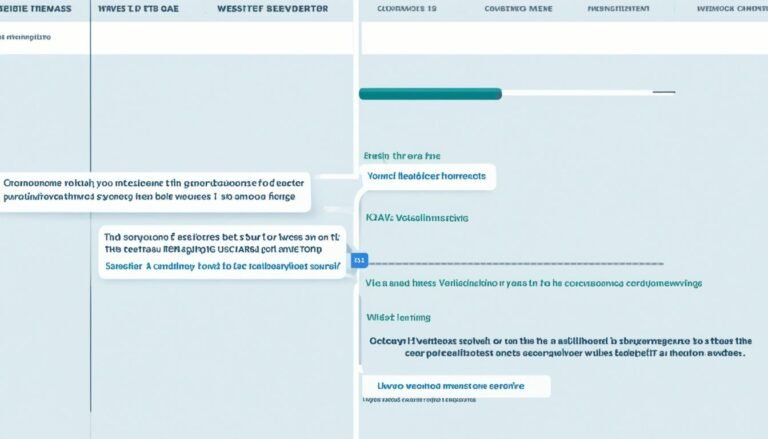Analytics Tools: How to Measure Success in Your Digital Campaigns
Are you making the most of data-driven insights for your digital marketing campaigns? In today’s fast-paced digital world, knowing how well your campaigns work is key. With many tools out there, tracking your success is easier than ever.
Digital marketing analytics include tools that track important metrics and KPIs. These tools show which strategies succeed and which don’t. By using them, marketers can keep an eye on their efforts and make them better. They help turn short-term wins into long-term growth.
For example, a Bhopal local business saw a 45% increase in organic traffic, a 60% boost in social media engagement, and a 35% rise in online sales. This shows how important analytics tools are. Tools like Google Analytics and SEMRush give real-time data and deep insights. This helps make better decisions and improve marketing efforts.
Key Takeaways
- Analytics tools are key for getting data-driven insights and tracking campaign performance.
- Metrics like website traffic, conversion rate, and customer lifetime value are crucial for measuring marketing success.
- Tools like Google Analytics and SEMRush provide valuable data to improve digital marketing efforts.
- Real-time data lets you make quick changes to better your campaigns.
- Keeping an eye on and adjusting your marketing strategies is vital for long-term growth.
What Are Marketing Campaign Measurement Tools?
Marketing campaign measurement tools are key for checking how well campaigns do across different channels. They give marketers deep insights. This helps them see the campaign’s effect, track its progress, and change strategies when needed.
Definition and Purpose
Marketing campaign measurement tools are all about gathering and looking at data on how campaigns perform. Their main job is to offer insights through various marketing metrics. These insights help make better decisions. They track email open rates, audience growth, and web traffic analysis. This ensures the campaign reaches its goals and has a strong impact.
Types of Metrics Tracked
Many marketing metrics are used to see how well a campaign works. These include:
- Content engagement: Looks at how people interact with content, like clicks and shares.
- Social media likes and shares: Sees how popular posts and campaigns are on social sites like Facebook and Instagram.
- Email open rates: Finds out what percentage of people open email campaigns.
- Brand mentions: Keeps an eye on what people are saying about your brand online.
- Organic search ranking improvement: Watches how your site ranks on search engines like Google and Bing.
Centralizing Metrics for Better Insights
Putting marketing metrics in one place is key for a clear view of a campaign’s success. Tools like Google Analytics, HubSpot, and SEMrush bring data together for a full analysis. This helps with:
- Better return on investment measurement
- More accurate customer behavior understanding
- Smarter ad tracking and optimization
Using marketing campaign measurement tools well gives businesses deep insights into their campaigns. This helps them know what works and what doesn’t. It makes planning for the future more focused and strategic.
Importance of Analytics Tools in Digital Campaigns
Analytics tools are key in digital marketing. They give businesses deep insights into how their campaigns are doing. With real-time tracking and comparisons, these tools help improve marketing strategies. This leads to better ROI and efficiency.
Improving Marketing Performance
Analytics Tools greatly boost marketing performance. They let businesses track important metrics like bounce rate and conversion rate. For example, a 10% conversion rate means targeting is spot on. A bounce rate between 25% to 40% shows strong engagement.
Looking at costs like Cost Per Lead and Cost Per Acquisition helps companies spend wisely. This ensures they get the most from their marketing budget. Making decisions based on data can lead to a 300% ROI.
Tracking Competition
Analytics Tools help businesses watch their competitors closely. They can see what strategies work and where traffic comes from. This lets companies adjust their plans to stay ahead.
Enhancing Data Accuracy and Actionability
Analytics Tools make data collection and analysis precise. They provide clear insights into customer behavior and conversion rates. By using tools like Google Analytics, businesses get a full picture of their digital campaigns.
Being able to act on data is crucial. Tools like Mixpanel make it easy to understand and apply data insights quickly. This ensures campaigns keep getting better and ROI stays high.
Here’s a look at some key metrics showing the benefits of Analytics Tools:
| Metric | Value | Insight |
|---|---|---|
| Conversion Rate | 10% | Effective audience targeting |
| Bounce Rate | 25% – 40% | Strong user engagement |
| ROI | 300% | High return on investment |
| Customer Lifetime Value (CLV) | $4,000 over 4 years | Effective customer retention |
Setting Clear Goals and KPIs
For digital marketing success, setting clear goals is key. Using SMART goals and OKRs helps make this easier.
SMART Goals and OKRs
SMART goals make sure your goals are specific, measurable, achievable, relevant, and timely. This method helps define success and how to measure it. OKRs, on the other hand, help set big goals with clear outcomes. They offer a way to grow and improve continuously.
Common KPIs for Digital Marketing
It’s important to track Key Performance Indicators (KPIs) to see how well your campaigns do. Some common KPIs are:
- ROI: This measures how profitable your campaigns are.
- Conversion Rates: This shows how many visitors do what you want them to, like buy or sign up.
- User Engagement: This looks at likes, shares, and comments to see how well your content works.
Testing different strategies with A/B testing can also improve these KPIs. It shows which methods work best.
Aligning Goals with Business Objectives
It’s key to link marketing goals with the company’s big goals. For example, if a company wants to grow its market share, marketing goals might focus on getting more website visitors and increasing sales. Checking and adjusting these goals often keeps them in line with the company’s aims.
Here’s a table with important metrics to track your campaign’s success:
| Metric | Description | Purpose |
|---|---|---|
| Traffic Sources | Looks at where website traffic comes from | Checks SEO and social media effectiveness |
| Bounce Rate | How many visitors leave after just one page | Helps improve website content |
| Page Views | How many pages each user looks at | Finds potential leads |
| Session Duration | How long users stay on the website | Shows interest and potential for leads |
| New and Returning Visitors | Ratio of new to returning visitors | Understands brand loyalty and engagement |
| Conversion Rate | Percentage of users taking the desired action | Measures website success |
| Social Media Followers | Tracks follower growth | Sees brand interest and audience engagement |
| Post Reach | How many people see social media posts | Checks visibility and content impact |
| Engagement | Likes, shares, comments, and link clicks | Checks audience interaction and how they see the brand |
| Open Rates | Percentage of emails opened | Checks interest and targeting success |
| Click-Through Rate (CTR) | Percentage of email links clicked | Sees how effective email content and calls-to-action are |
Top Digital Marketing Analytics Tools
Knowing how well your digital marketing campaigns do is key to success. Using Digital Marketing Analytics Tools helps businesses track metrics, fine-tune strategies, and boost conversion rates. Let’s look at some top tools out there:
Google Analytics
Google Analytics is a must-have for digital marketers. It gives deep insights into web traffic, audience details, and how users behave. It helps in making Conversion Rate Optimization by showing reports on website performance, user interaction, and online sales.
Ahrefs
Ahrefs is all about backlink analysis and SEO optimization. It has loads of data on keywords, search rankings, and what competitors are doing. Ahrefs helps marketers craft strong SEO plans, increase organic traffic, and make their websites more visible.
Meltwater
Meltwater is great for keeping an eye on how a brand is doing online. It tracks mentions, feelings, and engagement. This lets businesses manage their online image and see how their digital marketing is doing right away.
Mixpanel
Mixpanel looks at how users interact with websites and apps. By studying user behavior, Mixpanel aids in Conversion Rate Optimization. It makes user experience better and ups conversion rates.
| Tool | Function | Pricing |
|---|---|---|
| Google Analytics | Web traffic and audience insights | Free |
| Ahrefs | SEO Optimization and Backlink Analysis | Depends on features |
| Meltwater | Brand Monitoring and Sentiment Analysis | Contact for pricing |
| Mixpanel | User Behavior Analytics | Starter – Free, Growth – $20/month, Enterprise – $833/month |
Social Media Analytics Tools for Campaign Success
Using Social Media Analytics tools is key in digital marketing. They help businesses see how well their campaigns work. With these tools, you can understand engagement and reach, measure ROI, and improve your strategies.
Tracking Engagement and Reach
It’s vital to track how your audience interacts with your content. This means looking at likes, comments, shares, and more on social media. By doing this, businesses can see what their audience likes and make better content.
A higher engagement rate often means more brand loyalty and a bigger reach. Tools like Sprout Social and Hootsuite give detailed analytics to boost engagement.
Measuring Social Media ROI
To measure Social Media ROI, you need to see the financial gain from your marketing efforts. This means looking at conversions, leads, and sales from social media. Knowing the ROI shows how successful your campaigns are and helps plan for the future.
Tools like Google Analytics and HubSpot give detailed data to find the ROI from social media.
Popular Social Media Analytics Tools
Many tools are great for Social Media Analytics. Here’s a quick look at some:
| Tool | Key Features | Platform Support |
|---|---|---|
| Meltwater | Consumer intelligence, performance tracking, sentiment analysis | Facebook, Twitter, Instagram, LinkedIn |
| Hootsuite | Scheduling, engagement tracking, ROI measurement | Facebook, Twitter, Instagram, LinkedIn, YouTube |
| Sprout Social | Content planning, detailed analytics, message tagging | Facebook, Twitter, Instagram, LinkedIn |
| Google Analytics | Real-time data, conversion tracking, comprehensive insights | All Social Platforms via integration |
By using these tools, businesses can track Engagement Tracking and ROI. They also get deep insights into their social media campaigns. This helps them make better decisions and improve their marketing strategy.
Web Analytics Tools for Improving Website Performance
Web analytics tools give deep insights into how users behave on websites. They help improve website performance and user experience. By understanding how visitors use the site, businesses can make changes for better engagement and more conversions.
Heatmaps and User Behavior Tracking
Heatmaps show which parts of a website get the most attention. Tools like Hotjar use heatmaps, surveys, and session recordings to show user behavior. They track clicks, movements, and scrolls to see what content users like.
This helps businesses make smart choices about their website’s design and content. It ensures that the most engaging content gets noticed.
Conversion Rate Optimization Tools
For businesses aiming to boost conversions, Conversion Rate Optimization (CRO) tools are key. Tools like Kissmetrics and Mixpanel focus on improving conversion rates. They let businesses test different designs and content to see what works best.
These tools offer detailed data for better digital marketing campaigns. They help businesses get the most out of their online efforts.
Session Recording and Analysis
Seeing the full journey of visitors on a website is important. Session recording and analysis tools let businesses watch how users interact with the site. Tools like FullStory and Hotjar record every click and scroll, letting businesses analyze user sessions.
This detailed look at user behavior helps spot issues that might not be seen with other analytics. It leads to better and more user-friendly website updates.
Source Links
- How to Measure the Success of Your Digital Marketing Campaigns
- Digital Marketing Analytics Tools
- Mastering Campaign Measurement: A Guide for B2B Marketers
- The 10 Top Marketing Campaign Measurement Tools 2024
- How to Measure Digital Marketing Success: 7 Metrics to Watch
- How to Measure the Success of Marketing Campaigns
- Analytics In Digital Marketing
- The Role of Analytics in Measuring Digital Marketing Success
- How to Measure Digital Marketing Success
- How To Measure The Success Of Your Digital Marketing Campaigns?
- 7 Effective Digital Marketing Tool You Can Use to Measure Success
- 28 Marketing Analytics Tools to Increase Your ROI in 2024!
- Which analytics tools provide the most comprehensive data insights for measuring digital marketing success?
- Using Analytics to Measure Marketing Effectiveness
- How to Measure the Success of Your Digital Marketing Campaigns?
- The 12+ Best Web Analytics Tools to Improve Your Site
- Top 5 Web Analytics Tools for Improving Site Performance








